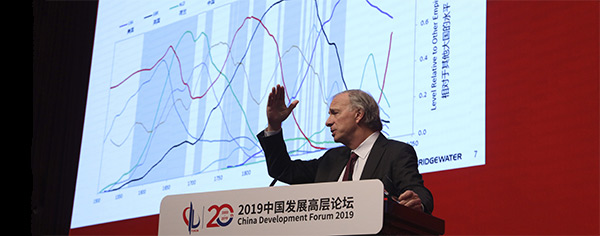
Ray Dalio Is Kinda, Sorta, Really Wrong
-
 John Mauldin
John Mauldin
- |
- June 7, 2019
- |
- Comments
- |
- View PDF
“The ideas of economists and political philosophers, both when they are right and when they are wrong, are more powerful than is commonly understood. Indeed, the world is ruled by little else. Practical men, who believe themselves to be quite exempt from any intellectual influences, are usually slaves of some defunct economist.”
—John Maynard Keynes
“Nothing is more dangerous than a dogmatic worldview—nothing more constraining, more blinding to innovation, more destructive of openness to novelty.”
—Stephen Jay Gould
“Inequality has emerged as a major issue in the US and beyond. A generation ago it could reasonably have been asserted that the overall growth rate of the economy was the main influence on the growth in middle-class incomes and progress in reducing poverty. This is no longer a plausible claim.
The share of income going to the top 1 percent of earners has increased sharply. A rising share of output is going to profits. Real wages are stagnant. Family incomes have not risen as fast as productivity. The cumulative effect of all these developments is that the US may well be on the way to becoming a Downton Abbey economy. It is very likely that these issues will be with us long after the cyclical conditions have normalized and budget deficits have at last been addressed.”
—Lawrence Summers (in the Financial Times, February 2014)
Ray Dalio is the thoughtful, somewhat controversial founder of the world’s largest hedge fund, Bridgewater Associates, which he started in 1975. While much of his writing is private, I (and many others) peruse every word we can of his and the Bridgewater team’s thinking. I find it to be some of the most interesting market commentary I read.
Lately Ray (read his bio here) has been far more open with his thinking, posting books and essays. This letter is the beginning of a response to his articles, Why and How Capitalism Needs To Be Reformed, Parts 1 and 2 and a follow-up piece titled It’s Time to Look More Carefully at ‘Monetary Policy 3 (MP3)’ and ‘Modern Monetary Theory’. He posted both publicly on LinkedIn.
On first reading those, I will admit to thinking, “Ray Dalio is kinda, sorta wrong.” I agreed with much of Part 1, with a few quibbles. Ditto for Part 2. But when I read the third piece I found myself thinking, “Ray Dalio is really, really wrong.” In that essay he basically endorses Modern Monetary Theory (MMT).
Coming from someone of Ray’s stature, and knowing that others like Bill Gross are beginning to endorse MMT either obliquely or directly, I found myself wanting to shout, “Stop! This is dangerous!”
As it turns out, Ray and I have mutual friends, and none describe him as particularly dangerous. They have nothing but good things to say about him, both businesswise and personally. He is clearly a generous man. And watching him in interviews and on stage, he is both disarming and comes across rather warmly. Definitely not dangerous. But ideas have consequences…
Ray’s essays are in his typical conversational style. There are plenty of footnotes and explanations in the combined 12,348 words (which fill 42 pages, not counting footnotes and appendixes). Almost any reader would agree with much of the first two-part essay.
Ray has done us all a service by pointing out the elephants in the room (some tinged with pink), which are rarely mentioned in public discourse. We discuss various parts of the elephant, but seldom the entire creature. By that, I mean the rapidly growing potential for left-of-center “progressive” control of both Congress and the White House. Part of that growth stems from an increasing frustration over the perceived differences between haves and have nots, between the protected and unprotected, combined with fascination for government solutions to our society’s perceived ills.
As The Economist reported recently, 51% of those polled between ages 18-29 have a positive view of socialism. That should scare you.
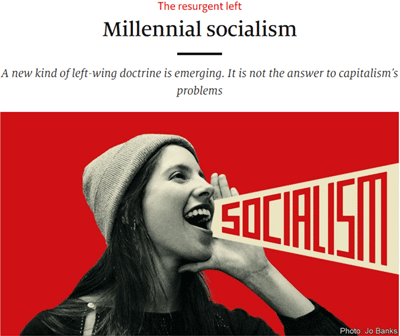
Source: The Economist
A growing number of that generation are taking that view into the voting booth. Democratic presidential candidates are all burnishing their “progressive” credentials. I have zero insight into who might win that nomination fight, but there is a more than reasonable chance it will be the most left-leaning presidential nominee in a very long time, since at least George McGovern (for whom I voted). And given the potential for recession between now and the election, they have a reasonable chance of winning.
Just as Trump figured out how to energize the frustration of enough voters to win the presidency, it is likely we will see a populist nominated on the Democratic side. A Democratic president and Congress will give us higher spending and taxes, and if that election happens amid recession, there will be an increasing drumbeat to “do something” radical. The already-huge $2-trillion deficit we will have by then could easily swell even more.
Dalio, to his credit, recognizes that would be a negative outcome. He proposes dealing with the increasing deficit and debt via Modern Monetary Theory (MMT) or directly printing money. He also hopes it would help equalize the increasing income and wealth disparities.
But I’m jumping ahead of myself. Today, I’ll begin an open multipart letter back to Ray in a conversational response. He addresses problems that are quite real and proposes solutions. We may not like them but at least he has ideas. His tone invites discourse, and so I intend to reply in that spirit. This is a potential learning moment for us all.
Dear Ray,
First, I want to thank you for the insight and wisdom you’ve offered over your career. They have intellectually enriched many of us. I find much to admire in your most recent essays but a few points leave me with serious trepidation.
That being said, I think we generally agree on the problems, and specifically that they pose a serious threat to US economic and social well-being. You use the word “existential threat” (or risk) several times in the essays. Someone as thoughtful as you doesn’t use that language lightly.
You talk about wealth and income disparity as a failure of capitalism. Quoting from you:
Over these many years I have also seen capitalism evolve in a way that it is not working well for the majority of Americans because it’s producing self-reinforcing spirals up for the haves and down for the have-nots. This is creating widening income/wealth/opportunity gaps that pose existential threats to the United States because these gaps are bringing about damaging domestic and international conflicts and weakening America’s condition.
I think that most capitalists don’t know how to divide the economic pie well and most socialists don’t know how to grow it well, yet we are now at a juncture in which either a) people of different ideological inclinations will work together to skillfully re-engineer the system so that the pie is both divided and grown well or b) we will have great conflict and some form of revolution that will hurt most everyone and will shrink the pie.
…which explains why I think that not reforming capitalism would be an existential threat to the US.
…These conditions pose an existential risk for the US.
The previously described income/wealth/opportunity gap and its manifestations pose existential threats to the US because these conditions weaken the US economically, threaten to bring about painful and counterproductive domestic conflict, and undermine the United States’ strength relative to that of its global competitors.
Like what you're reading?
Get this free newsletter in your inbox every Saturday! Read our privacy policy here.
I agree with this. The current situation could easily become a series of crises that would in fact be “existential,” as seen from today’s relatively benign world. We are being forced into difficult choices, both political and economic, and the longer we kick the proverbial can down the road, not dealing with the real fundamental issues, the more difficult and starker those choices will be.
We are rapidly approaching a time in which there will be no good choices, only extremely difficult, controversial and/or bad choices, none of which resolve the fundamental problems.
That said, we need to make sure our choices don’t exacerbate the problems.
Let’s start with what I think we agree upon: We both recognize that there is widening wealth and income disparity in the US. I would point out that that is a worldwide trend but agree it applies to the US in particular. This is causing political frustration, with what you term the potential to bring about “painful and counterproductive domestic conflict.” If by that you mean serious partisan divisiveness and angry rhetoric, I completely agree. The risk is that we veer widely from side to side of the road and never find the middle.
Income and Wealth Inequality
For the benefit of this letter’s readers, let’s recap some of your charts along with a few from my own letters on these subjects. You generally compare the top 40% and bottom 60%. You could have made a starker comparison using 80/20 or 90/10 or even 99/1. I congratulate you on avoiding the extremes to make your case.
Let’s look at some of your charts. This first one is self-explanatory, showing the top 40% have seen their incomes rise significantly while the bottom 60% have been flat for almost 50 years.
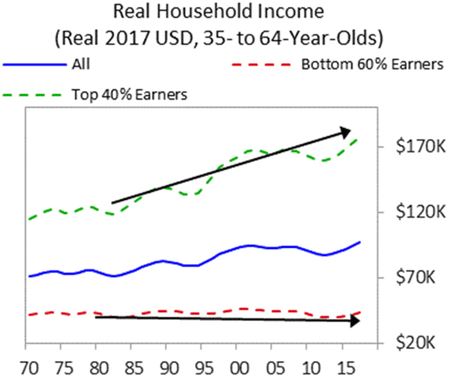
Source: Ray Dalio
I find in these next charts some of the more disheartening trends you describe. As I’m sure you know, survey data shows this may be the first generation in a long time that doesn’t expect their children will see higher living standards. Whatever the American dream is, the hope that we have for our children is embodied in it. That hope seems to be slipping away and it aggravates the political angst that concerns us both.
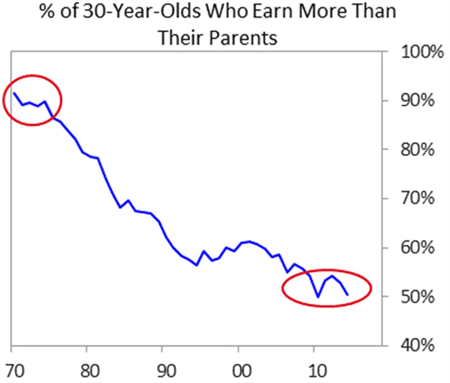
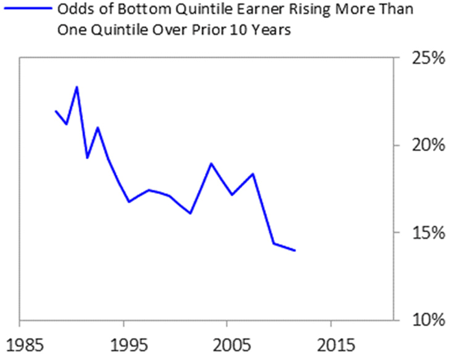
Source: Ray Dalio
The difference is even clearer when you look at the top 1% versus the bottom 90%...
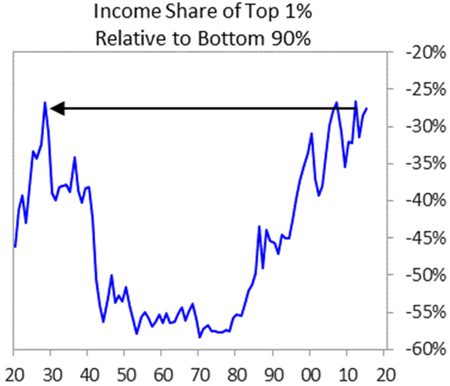
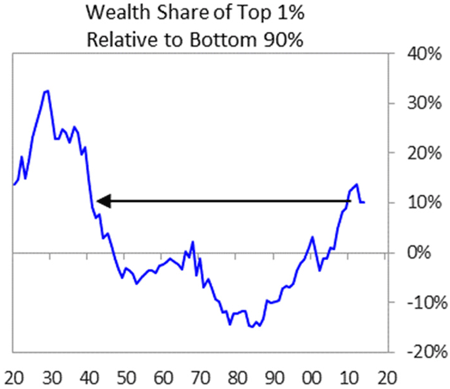
Source: Ray Dalio
…and when you look at income distribution and growth by quintiles over the last almost 50 years? It’s a very sobering reality.
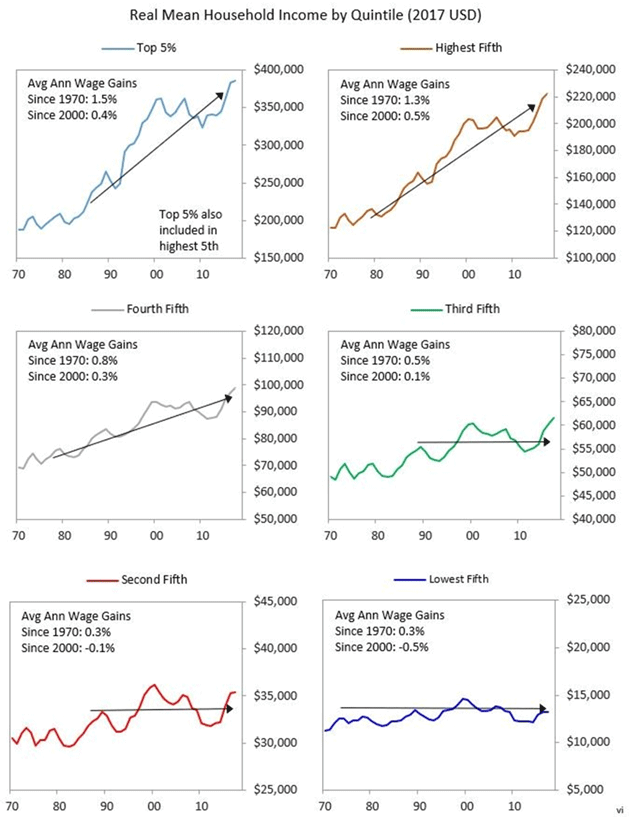
Source: Ray Dalio
My friend Bruce Mehlman shows it in different ways, which I used recently in a letter on inequality.
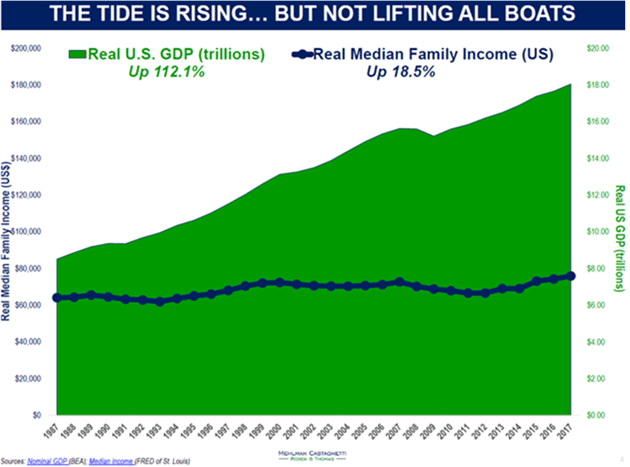
Source: Bruce Mehlman
Here’s another one comparing stock market growth with family net worth. This isn’t really surprising since we know the top quintile owns most of the stocks. The lower 80% see little direct benefit. But the magnitude of the disparity is still remarkable.
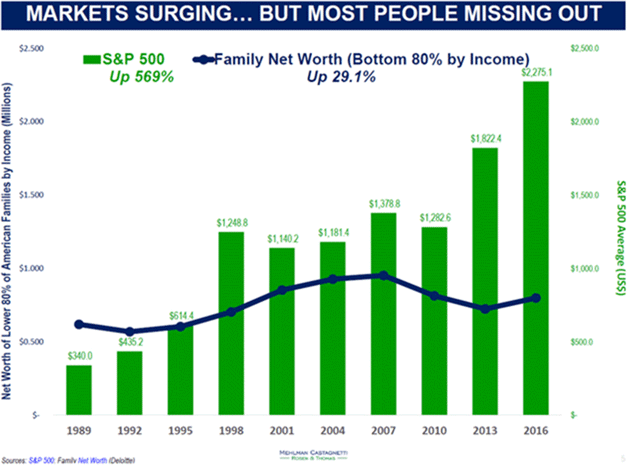
Source: Bruce Mehlman
I agree with you that the following is the most discouraging trend:
While most Americans think of the US as being a country of great economic mobility and opportunity, its economic mobility rate is now one of the worst in the developed world for the bottom. As shown below, in the US, people in the bottom income quartile have a 40% chance of having a father in the bottom quartile (in the father’s prime earning years) and people in the top quartile have only about an 8% chance of having a father in the bottom quartile, suggesting half of the average probability of moving up and one of the worst probabilities of the countries analyzed. In a country of equal opportunity, that would not exist.
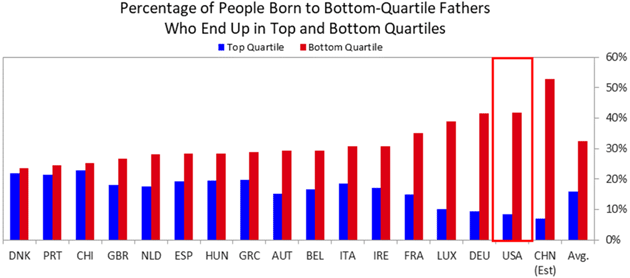
Source: Ray Dalio
This is yet another cause of the widening political and social divides. When parents no longer have hope their children can lead better lives, when children no longer feel they can rise above, the result is higher partisanship and populism.
[Sidebar: Ray does a more in-depth analysis of education, productivity, and economic outcomes in his Part 1. His analysis of the dismal state of public education in the United States is particularly discouraging.]
Is Capitalism the Problem?
You argue that capitalism is not achieving its goal of more equitably distributing the fruits [read: profits] of capitalism. To your point, my good friend Ben Hunt of Epsilon Theory notes that the S&P 500 companies have the highest earnings relative to sales in history.
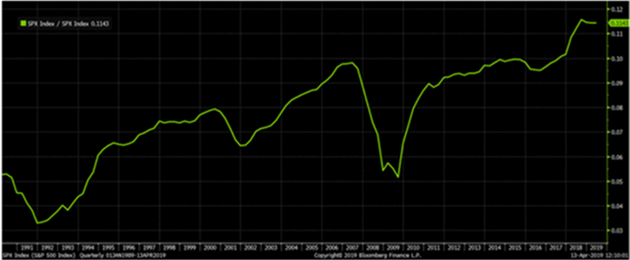
Source: Ben Hunt
Let me push back with what is admittedly a small quibble in the grand scheme of things. I think of capitalism more in the context of property rights, rule of law, and free markets. Properly understood, it provides a level playing field for entrepreneurs to offer goods and services that produce incomes and profits. I don’t think equitably distributing those profits is capitalism’s role.
Like what you're reading?
Get this free newsletter in your inbox every Saturday! Read our privacy policy here.
Ensuring that all participants are treated fairly and, to some extent, regulating these personal and corporate endeavors is the role of society in general and government in particular. So when you say that capitalists are not very good at sharing profits, I would say that capitalism is not designed to do so. That is the role of society and government.
Yes, capitalists are part of that society, and in general prefer to keep more of their profits and have less regulation. I agree that “capitalists” are not very good at distribution because of their own self-interest. And as you point out, when people begin to sense that their own particular interests are not being fairly addressed, there is the potential for political crisis. Quoting rather extensively from your letter:
The problem is that capitalists typically don’t know how to divide the pie well and socialists typically don’t know how to grow it well. While one might hope that when such economic polarity and poor conditions exist, leaders would pull together to reform the system to both divide the economic pie and make it grow better (which is certainly doable and the best path), they typically become progressively more extreme and fight more than cooperate.
In order to understand the phenomenon of populism, two years ago I did a study of it in which I looked at 14 iconic cases and observed the patterns and the forces behind them. If you are interested in it, you can read it here. In brief, I learned that populism arises when strong fighters/leaders of the right or of the left who are looking to fight and defeat the opposition come to power and escalate their conflict with the opposition, which typically galvanizes around comparably strong/fighting leaders. The most important thing to watch as populism develops is how conflict is handled—whether the opposing forces can coexist to make progress or whether they increasingly “go to war” to block and hurt each other and cause gridlock. In the worst cases, this conflict causes economic problems (e.g., via paralyzing strikes and demonstrations) and can even lead to moves from democratic leadership to autocratic leadership as happened in a number of countries in the 1930s.
We are now seeing conflicts between populists of the left and populists of the right increasing around the world in much the same way as they did in the 1930s when the income and wealth gaps were comparably large. In the US, the ideological polarity is greater than it has ever been and the willingness to compromise is less than it’s ever been. The chart on the left shows how conservative Republican senators and representatives have been and how liberal Democratic senators and representatives have been going back to 1900. As you can see, they are each more extreme and they are more divided than ever before. The chart on the right shows what percentage of them have voted along party lines going back to 1790, which is now the greatest ever. In other words, they have more polar extreme positions and they are more solidified in those positions than ever. And we are coming into a presidential election year. We can expect a hell of a battle.
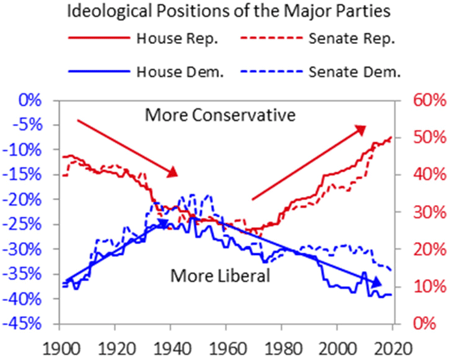
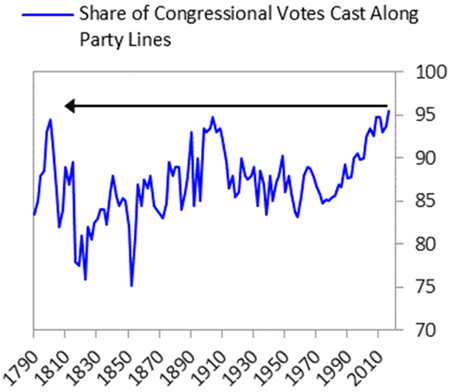
Source: Ray Dalio
I sadly agree that we are entering a period of rather severe partisanship. As a long-time participant in the political process, I think we are further from reasonable discussion and compromise than at any time of my life. I suspect you would agree as we are almost the same age.
Let me offer some thoughts on how the conflicts will unfold, and then present another possible solution. As you will see, I think MMT would make our problems even more intractable and raise the likelihood of a severe crisis…
(TO BE CONTINUED)
Next week we will deal with Ray’s further analysis of our problems (some of which I agree with) and then we’ll get into the most significant dispute, that of using MMT.
I think this is an important conversation, not just between two people but throughout the entire nation. The answers to the questions posed by the problems we agree upon will make a huge difference to both our society and our children’s future. Not to mention our own future.
Boston, New York, and ???
I am enjoying the beautiful weather here in Puerto Rico. At the end of the month, Shane and I will fly to Boston to be with our good friends Steve Cucchiaro and (his future bride) Jama to help celebrate their wedding. Then Shane goes to California for a week while I meet with my Mauldin Economics partners in Boston, and then take the train down to New York for a few days of meetings and media. Then on July 4 I fly to…? Well, I’m not sure. The next destination is up in the air as no meetings have been confirmed. Hopefully I will know by this time next week. Then I will meet up with Shane and we will go back to Puerto Rico.
Puerto Rico, or something, has been very good for me. Ten years ago I developed what my doctor (Mike Roizen, author of many best-selling books and otherwise known as Oprah’s doctor) diagnosed as late onset high blood pressure. Sometime around age 59 someone took my blood pressure dial, which for all my life had been quite normal, and cranked it to the right.
Mike told me, “There are 10 things that are important about staying healthy and the first three are blood pressure, blood pressure, and blood pressure.” He put me on two standard blood pressure medicines. They brought my blood pressure back under control. A few years later I stopped taking one of them as my blood pressure became more stable.
In my latest checkup, this year they found a little plaque in one of my arteries. In addition to prescribing a mild statin, Mike really stressed the importance of my diet. Shane has me eating mostly fish and chicken, in addition to cutting out cheese and dairy. This has been good for my weight but oddly, a few weeks ago, my blood pressure began to drop significantly.
The answer was to adjust my blood pressure medicine to an even smaller dose. I seem not to need as much because my body likes either the fish or the island lifestyle. Maybe some of both. It will be interesting to see if I reach the point where I don’t need any medicine at all. One can dream…
It’s time to hit the send button. I want to thank the many people who have been talking with me about Ray Dalio’s writings (you know who you are). This has been a significant learning experience for me and it certainly helped clarify my thinking about what I have been calling The Great Reset and Japanification. The cloudy crystal ball is getting a little bit clearer.
Let me wish you a great week and, if you are in the Midwest, a little sunshine and less rain!
Your rapidly developing an island lifestyle analyst,

John Mauldin
P.S. If you like my letters, you'll love reading Over My Shoulder with serious economic analysis from my global network, at a surprisingly affordable price. Click here to learn more.
Put Mauldin Economics to work in your portfolio. Your financial journey is unique, and so are your needs. That's why we suggest the following options to suit your preferences:
-
John’s curated thoughts: John Mauldin and editor Patrick Watson share the best research notes and reports of the week, along with a summary of key takeaways. In a world awash with information, John and Patrick help you find the most important insights of the week, from our network of economists and analysts. Read by over 7,500 members. See the full details here.
-
Income investing: Grow your income portfolio with our dividend investing research service, Yield Shark. Dividend analyst Kelly Green guides readers to income investments with clear suggestions and a portfolio of steady dividend payers. Click here to learn more about Yield Shark.
-
Invest in longevity: Transformative Age delivers proven ways to extend your healthy lifespan, and helps you invest in the world’s most cutting-edge health and biotech companies. See more here.
-
Macro investing: Our flagship investment research service is led by Mauldin Economics partner Ed D’Agostino. His thematic approach to investing gives you a portfolio that will benefit from the economy’s most exciting trends—before they are well known. Go here to learn more about Macro Advantage.
Read important disclosures here.
YOUR USE OF THESE MATERIALS IS SUBJECT TO THE TERMS OF THESE DISCLOSURES.
Tags
Did someone forward this article to you?
Click here to get Thoughts from the Frontline in your inbox every Saturday.

 John Mauldin
John Mauldin
